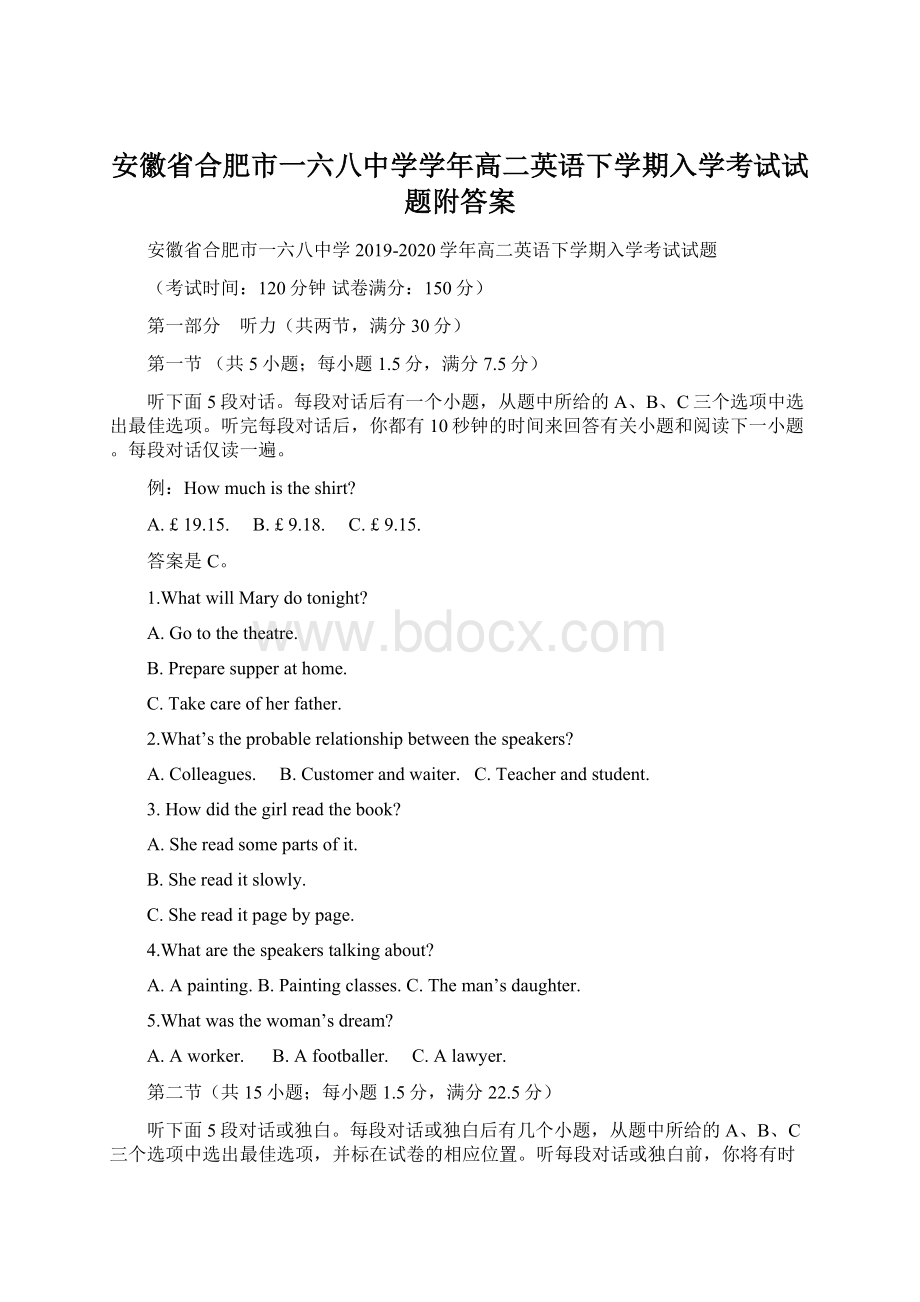安徽省合肥市一六八中学学年高二英语下学期入学考试试题附答案Word格式.docx
《安徽省合肥市一六八中学学年高二英语下学期入学考试试题附答案Word格式.docx》由会员分享,可在线阅读,更多相关《安徽省合肥市一六八中学学年高二英语下学期入学考试试题附答案Word格式.docx(12页珍藏版)》请在冰豆网上搜索。

A.£
19.15.B.£
9.18.C.£
9.15.
答案是C。
1.WhatwillMarydotonight?
A.Gotothetheatre.
B.Preparesupperathome.
C.Takecareofherfather.
2.What’stheprobablerelationshipbetweenthespeakers?
A.Colleagues.B.Customerandwaiter.C.Teacherandstudent.
3.Howdidthegirlreadthebook?
A.Shereadsomepartsofit.
B.Shereaditslowly.
C.Shereaditpagebypage.
4.Whatarethespeakerstalkingabout?
A.Apainting.B.Paintingclasses.C.Theman’sdaughter.
5.Whatwasthewoman’sdream?
A.Aworker.B.Afootballer.C.Alawyer.
第二节(共15小题;
每小题1.5分,满分22.5分)
听下面5段对话或独白。
每段对话或独白后有几个小题,从题中所给的A、B、C三个选项中选出最佳选项,并标在试卷的相应位置。
听每段对话或独白前,你将有时间阅读各个小题,每小题5秒钟;
听完后,各小题将给出5秒钟的作答时间。
每段对话或独白读两遍。
听第6段材料,回答第6、7题。
6.Whattimeisitnow?
A.5:
50.B.6:
00.C.6:
40.
7.Wherearethespeakers?
A.Attheairport.B.Atthestation.C.Atabookstore.
听第7段材料,回答第8至10题。
8.Whatdoesthemanthinkofthedepartmentstore?
A.Famous.B.Large.C.Deserted.
9.What’sclosetothemen’sclothingstore?
A.Abank.B.Afoodstore.C.Atheater.
10.Wheredoesthepostofficelie?
A.Acrossthestreet.B.Nexttothetheatre.C.Threeblocksaway.
听第8段材料,回答第11至13题。
11.Howdoesthemanadvisegoingtothepark?
A.Onfoot.B.Bybus.C.Bybike.
12.WhatwillthespeakersdoonSaturdaynight?
A.Relaxathome.
B.Organizeaparty.
C.Havedinnerwithfriends.
13.WhenwilltheyvisitthemuseumonSunday?
A.Inthemorning.B.Intheafternoon.C.Intheevening.
听第9段材料,回答第14至17题。
14.Whatisthemanspeaker?
A.Asecretary.B.Amanager.C.Aroommate.
15.Whathappenedtothewoman?
A.Herwindowwasbroken.
B.Herhousewasbrokeninto.
C.Somechildrenscoldedher.
16.Whywillthemancomeover?
A.Tocomfortthewoman.
B.Toknowaboutthedamage.
C.Toseekforsomeclues.
17.Howdidthewomanfeelwhenhearing“hecanbillmedirectly”?
A.Joyful.B.Surprised.C.Calm.
听第10段材料,回答第18至20题。
18.WhydidStevelikestayingonthehills?
A.Theviewswereexcellent.
B.Itcontributedtoimagination.
C.Hecouldgetfullrelaxation.
19.WhatstoriesdoesStevelovewriting?
A.Fairytales.B.Fantasticstories.C.Horriblestories.
20.WhatlifeisSteveliving?
A.Abusylife.B.Ahardlife.C.Aquietlife.
第二部分阅读理解(共两节,满分40分)
第一节(共15小题;
每小题2分,满分30分)阅读下列短文,从每题所给的A、B、C和D四个选项中,选出最佳选项,并在答题卡上将该项涂黑。
A
Readingmaybefundamental,buthowthebraingivesmeaningtolettersonapagehasbeenamystery.Twonewstudiesfillinsomedetailsonhowthebrainsofefficientreadershandlewords.Oneofthestudies,publishedintheApril30Neuron,suggeststhatavisual-processingareaofthebrainrecognizescommonwordsaswholeunits.Anotherstudy,publishedonlineApril27inPLOSONE,makesitknownthatthebrainoperatestwofastparallelsystemsforreading,linkingvisualrecognitionofwordstospeech.
MaximilianRiesenhuber,aneuroscientistatGeorgetownUniversityinWashington,D.C,wantedtoknowwhetherthebrainreadswordsletterbyletterorrecognizeswordsaswholeobjects.Heandhiscolleaguesshowedsetsofrealwordsornonsense(无意义的词语)wordstovolunteersundergoingfMRIscans.Thewordsdifferedinonlyoneletter,suchas“farm”and“form”or“soat”and“poat”,orwerecompletelydifferent,suchas“farm”and“coat”or“poat”and“hime”.Theresearcherswereparticularlyinterestedinwhathappensinthevisualwordformarea,orVWFA,anareaontheleftsideofthebrainjustbehindtheearthatisinvolvedinrecognizingwords.
Riesenhuberandhiscolleaguesfoundthatneurons(神经元)intheVWFArespondstronglytochangesinrealwords.Changing“farm”to“form”,forexample,producedasgreatachangeinactivityaschanging“farm”to”coat”,theteamreportsinNeuron.Thearearespondedslowlytosingle-letterchangesinmade-upwords.
Thedatasuggeststhatreadersgrasprealwordsaswholeobjects,ratherthanfocusingonlettersorlettercombinations.Andasareader’sexposuretoawordincreases,thebraincomestorecognizetheshapeoftheword.Meaningispassedonafterrecognitioninthebrain,Riesenhubersays.
Theresearchersdon’tyetknowhowlongerandlessfamiliarwordsarerecognized,orifthebraincanbetrainedtorecognizenonsensewordsasaunit.
21.Riesenhuber’sresearchprobablyfocusesonwhetherthebrain______.
A.handlesnonsensewordsasaunit
B.operatestwofastparallelsystemsforreading
C.takeslongertoreadlessfamiliarwordsornot
D.recognizeswordsasaunitorreadsthemletterbyletter.
22.Riesenhuberandhiscolleaguescarriedouttheirresearchby______.
A.showingpairsofdifferentwords
B.arrangingthewordsindifferentorder
C.givingpairsofrealwordstotallydifferent
D.makingvolunteersreadsomelongerwords
23.Riesenhuber’sresearchissignificantinthatitshowshowthebrain______.
A.respondstofamiliarwordsB.recognizestheformofaword
C.relatesmeaningtolettersD.reactstomade-upwords
B
Overthepastcoupleofdays,onourlocalFreecyclepagetherehavebeenalotofwantedposts,allfromthesameperson,basicallyaskingforeverythingyou’dneedtosetupahousefromscratch.
Oneofthethingstheyaskedforwasaqueen-sizedbed.Atthattimewejusthappenedtohaveanextraone,soImessagedthem.Theyimmediatelycameintheafternoon.Thepeoplewhocame,twoladiesandaman,areactuallyfriendsofanotherwomannamedJennywhoownedayoungboy.Thiswomanhasescapedfromadangerous,violentrelationshipandthesefriendsofhersarehelpingherandhersonstartoveragain,witheverythingfromfurnituretotoothbrushesontheirlistofneeds.
Whiletheywerehere,Ialsogavethemoneofoursparebookcaseandsomecoffeecups.Ievenaskedthemtokeepintouchincasetheyneededanythingelse—Ihaveawayofconnectingpeoplewiththings.Iofferedthewomanacupboardwehadaswell;
herfriendsjustneededtoseeiftherewasaplaceoraneedforitintheirfriend'
snewhome.
Iwassoexcitedtomeetthoselovingpeople,whowereobviouslywillingtohelptheirfriend.Itwasclearhowprotectivetheyfeltofthiswomanandherboy,howmuchtheyloveherandwantedhertohaveahappyandsafelife,andtospendevenafewminuteswithpeoplelikethatisanexperienceI’llrememberforalong,longtime.
Aquickthank-youtoallwhohavesentmoredonationsoverthelastcoupleofdays,aswellaslovelymessagesofthanksandblessings.Sometimesit’shardtokeepupwithitall,butit’saproblemI’mhappytohave.
24.Whatwerethepeoplewhoarrivedattheauthor’sintheafternoongoingtodo?
A.Promotesomeproductscustomersneeded.
B.Fetchthebedtheauthorwouldgiveaway.
C.Recyclesecond-handfurniture.
D.Helprepairtheauthor'
sfurniture.
25.Whichofthefollowingwordscanbestdescribetheauthor?
A.Warm-hearted.B.Mean.C.Narrow-minded.D.Intelligent.
26.Fromthelasttwoparagraphs,wecaninferthat_____.
A.theauthordoesn'
tliketospendtoomuchtimewiththosepeoplelikeJenny'
sfriends
B.Jennyandherboywillhardlygethelpfromtheauthor'
C.theauthorwasdisappointedwiththoseonlysendingmessagesofthanksandblessings
D.Jennyandherboywillhaveanewstartwiththehelpofpeople
27.Thesuitabletitleforthetextshouldbe“_________”
A.Nopains,nogainsB.Godhelpsthosewhohelpthemselves
C.ManyhandsmakelightworkD.Wherethereiswill,thereisaway
C
Whenyoustartworkingonsomethingbutdon'
tfinishit,thoughtsoftheunfinishedworkcontinuetojumpintoyourmindevenwhenyou'
vemovedontootherthings.Psychologists(心理学家)refertothispsychologicalphenomenonastheZeigarnikeffect.TheeffectwasfirstobservedbyaRussianpsychologistnamedBlumaZeigarnik.WhilesittinginabusyrestaurantinVienna,shenotedthewaitershadbettermemoriesofunpaidorders.Oncethebillwaspaid,however,thewaitershaddifficultyrememberingtheexactdetailsoftheorders.
Inresearch,participantswereaskedtocompletesimpletaskssuchasputtingtogetherpuzzles,orsolvingmathproblems.Halfoftheparticipantswereinterruptedhalfwaythroughthesetasks.Afteranhour-longdelay,Zeigarnikaskedtheparticipantstogiveanaccountofwhatthey'
dbeenworkingon.Shediscoveredthatthosewhohadtheirworkinterruptedweretwiceaslikelytorememberwhattheyhadbeendoingasthosewhohadactuallycompletedthetasks.
Wecanusethiseffecttoouradvantage.Forexample,ifyou'
restrugglingtomemorizesomethingimportant,momentaryinterruptionsmightactuallyworktoyouradvantage.Ratherthansimplyremembertheinformationoverandoveragain,reviewitseveraltimesandthentakeabreak.Whileyou'
refocusingonotherthings,you'
llfindyourselfmentallyreturningtotheinformationyouwerestudying.
Weoftenputofftasksuntilthelastmoment,onlycompletingtheminarushatthelastpossiblemoment.Unfortunately,thistendencycanleadtoheavystressandevenpoorperformance.OnewaytoovercomethisistoputtheZeigarnikeffecttowork.Startbytakingthefirststep,nomatterhowsmall.Onceyou'
vebegun—butnotfinished—yourwork,you'
llfindyourselfthinkingofthetaskuntil,atlast,youfinishit.Youmightnotfinishitallatonce,buteachsmallstepyoutakeputsyouclosertoyourfinalgoal.
28.WhatdoestheZeigarnikeffectreferto?
A.Waiterstendtohavegoodmemori